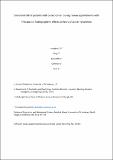Files in this item
Emotional talk of patients with breast cancer during review appointments with therapeutic radiographers : effects on fears of cancer recurrence
Item metadata
| dc.contributor.author | Humphris, Gerald Michael | |
| dc.contributor.author | Yang, Y | |
| dc.contributor.author | Barracliffe, L | |
| dc.contributor.author | Cameron, J | |
| dc.contributor.author | Bedi, C | |
| dc.date.accessioned | 2019-09-30T23:37:22Z | |
| dc.date.available | 2019-09-30T23:37:22Z | |
| dc.date.issued | 2018-10-01 | |
| dc.identifier | 255998686 | |
| dc.identifier | 50119422-976b-4e4f-af72-2d17519e3af1 | |
| dc.identifier | 85054375331 | |
| dc.identifier | 000466954400023 | |
| dc.identifier.citation | Humphris , G M , Yang , Y , Barracliffe , L , Cameron , J & Bedi , C 2018 , ' Emotional talk of patients with breast cancer during review appointments with therapeutic radiographers : effects on fears of cancer recurrence ' , Supportive Care in Cancer , vol. First online . https://doi.org/10.1007/s00520-018-4484-7 | en |
| dc.identifier.issn | 0941-4355 | |
| dc.identifier.other | ORCID: /0000-0002-4601-8834/work/64033921 | |
| dc.identifier.uri | https://hdl.handle.net/10023/18587 | |
| dc.description | FORECAST study supported generously by Breast Cancer Now (Reg. No. SP529). | en |
| dc.description.abstract | Fears of cancer recurrence (FCR) in patients with breast cancer may develop during radiotherapy. Radiographer communication with their patients may influence early survivorship FCR level. Aim To investigate the management of emotional talk in patients with breast cancer attending their initial review appointments during radiotherapy and predict FCR at 6–8 weeks follow-up. Methods A mixed-methods observational study was conducted. Patients (consecutive sample, n = 60) with breast cancer, attending a major Scottish cancer centre, had their first two review appointments with their therapeutic radiographer (TR) audio-recorded. In addition, FCR was assessed (FCR7) at baseline and at 6–8 weeks following their final radiotherapy visit. Two TRs participated. Audio files were coded by the VR-CoDES system to identify emotional cues and therapeutic radiographer (TR) responses. Linear regression models were tested for fit and to identify factors associated with follow-up FCR, i.e. patient cues, responses by TR. Results Follow-up FCR was predicted negatively (robust estimator, p = .01) by level of patient emotional talk at the second review session. The provision of space by the TR, at the second session, to enable patients to expand their emotional utterances was also associated, but negatively (p = .01), with follow-up FCR. These effects were maintained after inclusion of covariates: age, treatment received and living conditions. Conclusions Patient’s emotional expression and TR responses at the second review meeting predicted follow-up FCR. The study shows the effect of communication processes on this specific distress component of the patient’s survivorship experience. Trial registration NCT02599506 | |
| dc.format.extent | 9 | |
| dc.format.extent | 1114022 | |
| dc.language.iso | eng | |
| dc.relation.ispartof | Supportive Care in Cancer | en |
| dc.subject | Breast cancer patients | en |
| dc.subject | Fears of recurrence | en |
| dc.subject | Communication | en |
| dc.subject | Emotional talk | en |
| dc.subject | Survivorship | en |
| dc.subject | Distress | en |
| dc.subject | Therapeutic radiotherapy | en |
| dc.subject | Behavioural coding | en |
| dc.subject | HT Communities. Classes. Races | en |
| dc.subject | RC0254 Neoplasms. Tumors. Oncology (including Cancer) | en |
| dc.subject | NDAS | en |
| dc.subject | SDG 3 - Good Health and Well-being | en |
| dc.subject.lcc | HT | en |
| dc.subject.lcc | RC0254 | en |
| dc.title | Emotional talk of patients with breast cancer during review appointments with therapeutic radiographers : effects on fears of cancer recurrence | en |
| dc.type | Journal article | en |
| dc.contributor.institution | University of St Andrews. Population and Behavioural Science Division | en |
| dc.contributor.institution | University of St Andrews. WHO Collaborating Centre for International Child & Adolescent Health Policy | en |
| dc.contributor.institution | University of St Andrews. Health Psychology | en |
| dc.contributor.institution | University of St Andrews. St Andrews Sustainability Institute | en |
| dc.contributor.institution | University of St Andrews. School of Medicine | en |
| dc.identifier.doi | 10.1007/s00520-018-4484-7 | |
| dc.description.status | Peer reviewed | en |
| dc.date.embargoedUntil | 2019-10-01 |
This item appears in the following Collection(s)
Items in the St Andrews Research Repository are protected by copyright, with all rights reserved, unless otherwise indicated.

